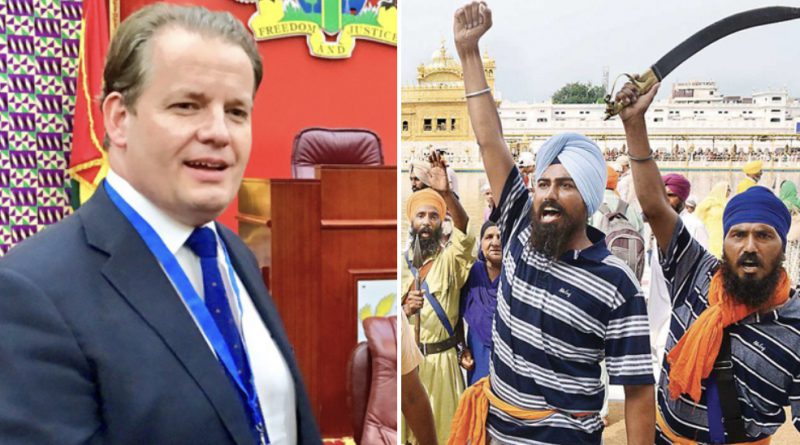Britain should crackdown on extremist Khalistani elements: UK Faith Advisor Bloom
London – The United Kingdom Government should carryout crack down against the small group of extremist Khalistani elements who use aggressive tactics to encourage the Sikhs in UK for their ulterior agenda, British faith advisor Colin Bloom advised the government.
The faith advisor of an independent review commissioned by the British government informed media that a tiny minority amongst the Sikh community in UK “are very aggressive, very loud and not representative of majority British-Sikh community”.
The British government must acknowledge religious organizations as a positive force, according to the key review of faith engagement by Colin Bloom.
Bloom considered how the government might honor religious organizations’ contributions while combating harmful practices.
The public survey received more than 21,000 responses, and Bloom provided the British government with 22 suggestions.
Bloom said, “We are seeing a very small group of people using aggressive tactics to try and outrage all Sikhs to believe what they believe about whether it’s… Khalistan or other issues. And so I’m very pleased to say that in the last few years, the British government has been increasing its awareness of this problem and they’re beginning to tackle it. But my report is the first, I think, to really lay out very clear terms, which is evidence-based, that this is a problem that needs to be addressed”.
He claimed that the authority had no qualms about taking seriously the threat posed by pro-Khalistan and Sikh extremists.
“The problem…with this is that there are overwhelming majority of the nicest, kindest and most decent people in the UK. And, a tiny minority amongst them are very aggressive, very loud and not representative of majority British-Sikh community”, he said. “Let’s not forget that there are still a number of Sikh extremist and terrorist organizations that are prescribed as terrorist organizations, whether that’s Babbar Khalsa…” he said, noting that International Sikh Youth Federation was banned but has been “de-proscribed” in the UK.
The Khalistan movement has its roots in the partition of India and Pakistan. Some Sikhs argued for the establishment of an independent Sikh state, to be known as Khalistan, in their former homeland of Punjab after Pakistan was established as an overt Islamic Republic for the Subcontinent’s Muslims, and India was established as a secular republic. Since then Khalistan movement has been active against India.
On March 19, a huge number of Indians gathered in front of the Indian High Commission in London to protest against the “disrespectful act” of Khalistan supporters against the Indian flag. They demanded swift retaliation.
Later, India brought up the issue of the security of its diplomatic missions in the UK and demanded that the British government take swift action against the anti-India elements.
Bloom hoped that the extremist actions of a few people wouldn’t damage the bilateral ties between Britain and India.
“I hope it doesn’t damage the relations between the UK and India. We have some of the strongest ties, a great deal of affection, and obviously, a shared history that goes back many hundreds of years”, Bloom said.
“I hope that continues, whether that’s with the British Hindu community, the British Sikh community, the British Muslim community, whoever it may be, we have to continue to build on those things that bind us together rather than would divide us”, he added.
Willian Shawcross Report
William Shawcross’ Independent Review of Prevent, the British counter-extremism program, issued a warning in February about the rise of pro-Khalistan extremism in the UK’s Sikh communities.
Shawcross noted that the Khalistanis were inciting Sikhs in Britain to rebel against the British government, and spreading false accusations that the British government was persecuting Sikhs and aiding the Indian government in doing the same in India, while glorifying violence committed by the pro-Khalistan movement in India.
The investigation should look into the larger context in which this particular incident occurred as well as the mistakes that allowed this threat to go unchecked for too long.
Similar to Islamist hate preachers, Khalistani activists have been promoting an ideology and a series of conspiracy theories that have led Sikhs in Britain to believe that violence is acceptable in “self-defence” since they are constantly being attacked.
This puts the entire society in peril by dividing a varied population that depends on intercommunal harmony and understanding to prosper. It is also harmful for Sikhs since it runs the risk of encouraging youth and others to engage in terrorism and criminality.



